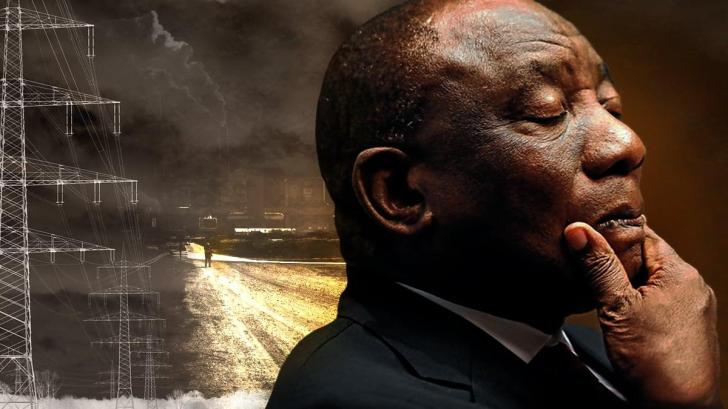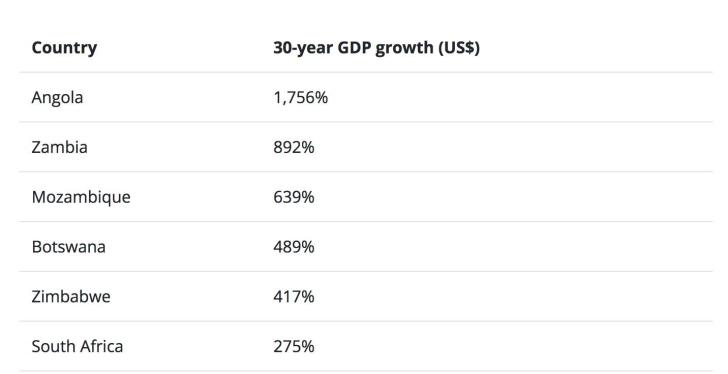News / National
Zimbabwe's economy grew faster than South Africa's since the ANC took over
12 Feb 2024 at 15:13hrs |
0 Views

President Cyril Ramaphosa's claims about South Africa's economic growth during his 2024 State of the Nation Address (SONA) hid the truth about how badly the country is really performing.
In his address, Ramaphosa said they have worked hard to undo the damage caused during state capture under former President Jacob Zuma.
He said the real tragedy of state capture was that it diverted attention and resources from growing the economy and creating jobs.
"Over the past five years, we have worked to revive our economy from a decade of stagnation and protect it from domestic and global shocks," Ramaphosa said.
"We have made progress. Our economy is today three times larger than it was 30 years ago."
At face value, growing the economy by 300% sounds impressive and creates the impression that the government has done good work.
However, anyone with a basic understanding of economics realises that Ramaphosa employed an elementary political trick to make a dismal situation look better.
Instead of using a standard economic measure, like the average annual GDP growth, he used an absolute figure. An absolute figure can make most things sound great.
For example, in the 30 years before the ANC took the reins, South Africa's economy grew by 1,357% in US$ terms. It is five times higher than the next 30 years under ANC rule.
The latest World Bank gross domestic product (GDP) data for South Africa and Zimbabwe further shows why his claim is misleading.
- Between 1993 and 2022, South Africa’s GDP in US$ terms increased by 275%.
- Between 1993 and 2022, Zimbabwe’s GDP in US$ terms increased by 417%.
It is telling that Zimbabwe's economic growth was much higher than South Africa's despite its hardships over the last 24 years.
In 2000, Zimbabwe entered a devastating economic spiral following the government's controversial land reform program.
Expropriating white-owned farms, coupled with involvement in the DRC war, drained finances and sparked international sanctions.
Inflation skyrocketed, reaching a peak of 231 million percent in 2008, rendering the Zimbabwean dollar worthless.
Basic necessities became scarce, leading to widespread poverty and hunger. This economic meltdown continues to cast a long shadow over Zimbabwe's present and future.
Despite this economic devastation, Zimbabwe's economic growth was still much higher than South Africa's. It shows just how dismal the local economy performed.
Ramaphosa also hid that South Africa's economy, measured in US$, is now significantly smaller than in 2011.
The World Bank's data for South Africa showed that the local economy shrunk from $458 billion in 2011 to $405 billion in 2022.
Over the same period, the World's GDP increased by 36% – from $74 trillion in 2011 to $101 trillion in 2022.
South Africa's poor economic growth in one table
A good way to assess South Africa's economy under ANC rule is to compare it to other countries in the region, like Zimbabwe, Botswana, and Angola.
For this comparison, Daily Investor used data from the World Bank, where GDP growth is measured in US dollars.
It shows that all its neighbours, including Zimbabwe, significantly outperformed South Africa since the ANC took the reigns.

In his address, Ramaphosa said they have worked hard to undo the damage caused during state capture under former President Jacob Zuma.
He said the real tragedy of state capture was that it diverted attention and resources from growing the economy and creating jobs.
"Over the past five years, we have worked to revive our economy from a decade of stagnation and protect it from domestic and global shocks," Ramaphosa said.
"We have made progress. Our economy is today three times larger than it was 30 years ago."
At face value, growing the economy by 300% sounds impressive and creates the impression that the government has done good work.
However, anyone with a basic understanding of economics realises that Ramaphosa employed an elementary political trick to make a dismal situation look better.
Instead of using a standard economic measure, like the average annual GDP growth, he used an absolute figure. An absolute figure can make most things sound great.
For example, in the 30 years before the ANC took the reins, South Africa's economy grew by 1,357% in US$ terms. It is five times higher than the next 30 years under ANC rule.
The latest World Bank gross domestic product (GDP) data for South Africa and Zimbabwe further shows why his claim is misleading.
- Between 1993 and 2022, South Africa’s GDP in US$ terms increased by 275%.
- Between 1993 and 2022, Zimbabwe’s GDP in US$ terms increased by 417%.
It is telling that Zimbabwe's economic growth was much higher than South Africa's despite its hardships over the last 24 years.
In 2000, Zimbabwe entered a devastating economic spiral following the government's controversial land reform program.
Expropriating white-owned farms, coupled with involvement in the DRC war, drained finances and sparked international sanctions.
Inflation skyrocketed, reaching a peak of 231 million percent in 2008, rendering the Zimbabwean dollar worthless.
Basic necessities became scarce, leading to widespread poverty and hunger. This economic meltdown continues to cast a long shadow over Zimbabwe's present and future.
Despite this economic devastation, Zimbabwe's economic growth was still much higher than South Africa's. It shows just how dismal the local economy performed.
Ramaphosa also hid that South Africa's economy, measured in US$, is now significantly smaller than in 2011.
The World Bank's data for South Africa showed that the local economy shrunk from $458 billion in 2011 to $405 billion in 2022.
Over the same period, the World's GDP increased by 36% – from $74 trillion in 2011 to $101 trillion in 2022.
South Africa's poor economic growth in one table
A good way to assess South Africa's economy under ANC rule is to compare it to other countries in the region, like Zimbabwe, Botswana, and Angola.
For this comparison, Daily Investor used data from the World Bank, where GDP growth is measured in US dollars.
It shows that all its neighbours, including Zimbabwe, significantly outperformed South Africa since the ANC took the reigns.

Source - Daily Investor
Join the discussion
Loading comments…





























